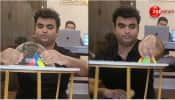Boston: Terming Indo-Pak ties as the "worst divorce" between a couple, Pakistan`s envoy to the US Husain Haqqani has said the terrorists based in his country do not want relations with New Delhi to normalise.
While acknowledging that the Mumbai attacks case in Pakistan was proceeding with a slow pace, Haqqani said the 26/11 strikes were orchestrated by extremists who want India and Pakistan to "go to war".
The two countries need to work together to eliminate terrorism from the region and ensure that "there are no terrorist victims in Pakistan or in India," he said here.
"The terrorists in Pakistan do not want Pakistan and India to normalise (their ties). The extremists want Pakistan and India to go to war and so they orchestrated the Mumbai tragedy," Haqqani said in response to a question during a seminar on `The Future of South Asia` organised by the South Asia Initiative at Harvard University.
He said Pakistan remains engaged with India to make sure "justice is provided to victims of the Mumbai tragedy."
"Since the day that (26/11 Mumbai attack) happened we have always maintained that we are on the side of the victims and we will certainly bring the perpetrators to justice if those perpetrators are found to be in any way from or connected to Pakistan and those that have been identified are on trial and they will be dealt with in accordance with the law," Haqqani said to a news agency after the seminar.
Earlier, speaking to an audience of Harvard students and professors, he said Pakistan`s response to the 26/11 Mumbai attacks has been "very clear" and it is pursuing the case, though he admitted that the process has been slow.
"It is a slow process. There is something wrong there (Pakistan) in the system. If the Mumbai case is proceeding slowly it is not because we (Pakistan) don`t want it to proceed fast, it is just that there is an in-built structural issue here which will take time to change.
"There are rules, there are advantages that the defence has in terms of being able to postpone (the case), etc," he said.
Describing India-Pakistan relationship as the "worst divorce" between a couple who have each been given "nuclear weapons," Haqqani said: "It is important to understand that the tragedy of 1947 was a tragedy for both people, millions suffered.
"We need to humanise each other and understand that we live in the same neighbourhoood, have a lot of shared history and we definitely have the potential for shared economic and other relations. But they cannot be dealt by demonising one
another." Pointing out that "there is politics on the Indian side as well," Haqqani said there are people in India who say there is "no need to talk" to Pakistan in the wake of "Kargil" and "Mumbai". Such an approach "undermines the process" and if
India and Pakistan do not continue talks then there is nothing to be gained, he added.
"Our effort always has been to try and rebuild the process. I know there are people in India who say that because of Kargil, because of Mumbai, what is the point. Our argument is what is the point in not continuing to try because there is no alternative.
The alternative is war and nobody wants war."
Haqqani said the two countries are trying to restart the process and "we will have a comprehensive dialogue and we are committed to the notion of good relations."
While disagreements between the two countries will persist, the Ambassador said they have to find a way to manage the conflict and resolve it in a manner in which it works to the advantage of the people of India and Pakistan.
"That remains critical. Right now the coalition numbers in Pakistan do not make it that easy to take the great leap forward and we feel the same applies to India. There also we feel that a great leap is not possible."
"We have some disagreements including the dispute over Jammu and Kashmir. We can work around those disputed issues and find a way to have a dialogue that will bring stability, peace and justice," to the two nations, Haqqani said.
India and Pakistan, which have shared history, elements of culture and economic potential, will have to, at some point, "leave the burden of history behind," he said, adding that "we cannot continue to discuss the events and circumstances of Partition for another 64 years."
Urging young Indians, Pakistanis and Bangladeshis to change the "narrative" prevalent in South Asia, Haqqani said a narrative of "permanent conflict" is not going to be good for either country. "When Indians say we are the same, I say okay we are the same, then treat us differently - meaning do not demonise us, show us the respect that is due to us."
He hoped that India and Pakistan will overcome their "difficulties of lack of mutual trust in the future."
Occasionally the mistrust takes over but most of the times both nations realise that "our future lies in working out our problems because conflict has not served either the people of India or the people of Pakistan," the envoy said.
Noting that Pakistan is seen by many as a "troubled state," he said Pakistan is engaged in a war for its survival.
"Pakistan`s problems and difficulties have been the result of neglecting politics for a very very long time."
The way forward for Pakistan is that it has to "transform itself completely into a democracy," Haqqani said.
"There is great realisation in Pakistan that Pakistan has been overly militaristic and militant-oriented in its culture and orientation. No nation progresses purely with a militaristic attitude. Totally militaristic and militant attitude produces North Koreas and does not produce South Koreas," he said during the seminar.
PTI















